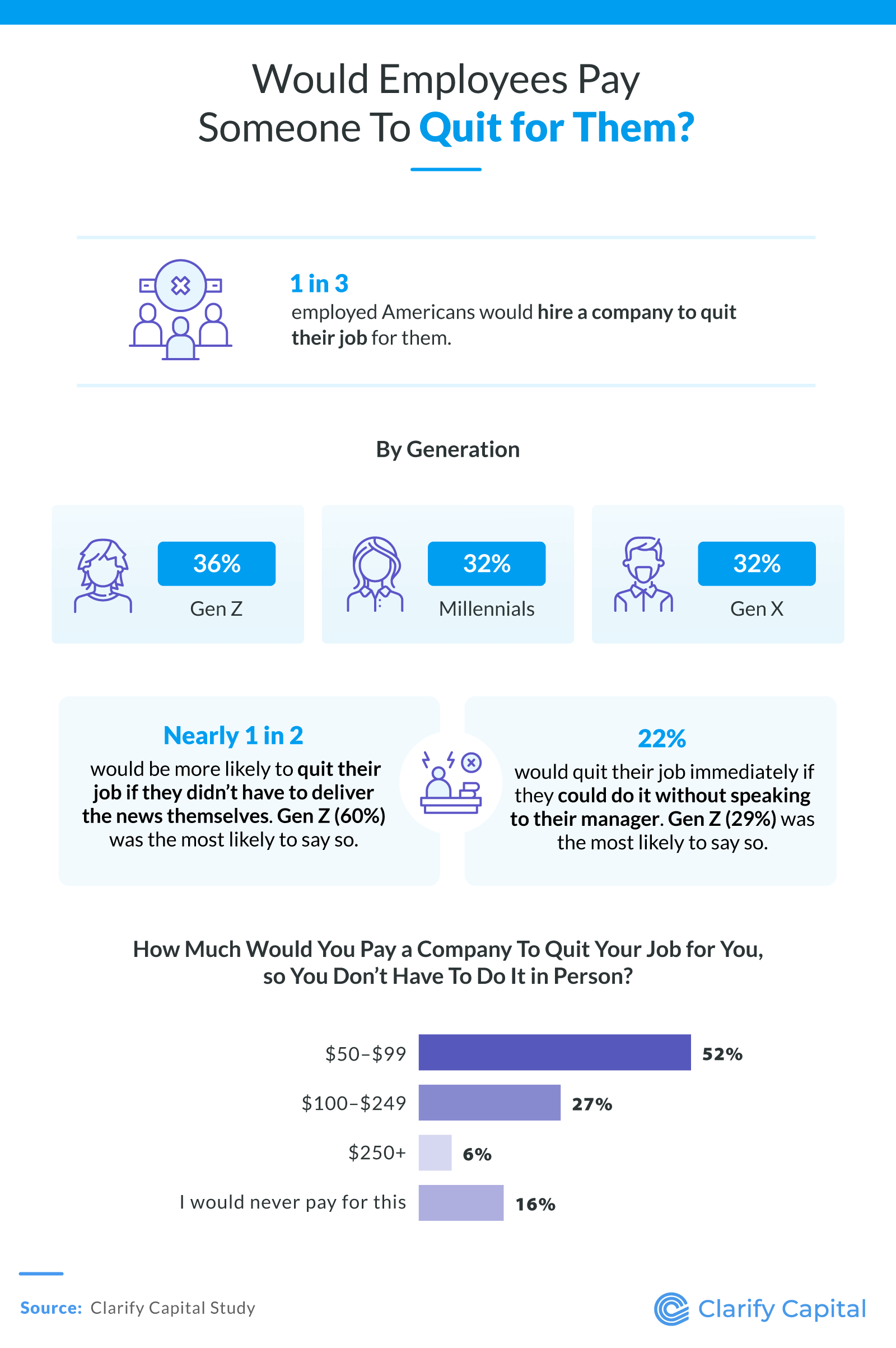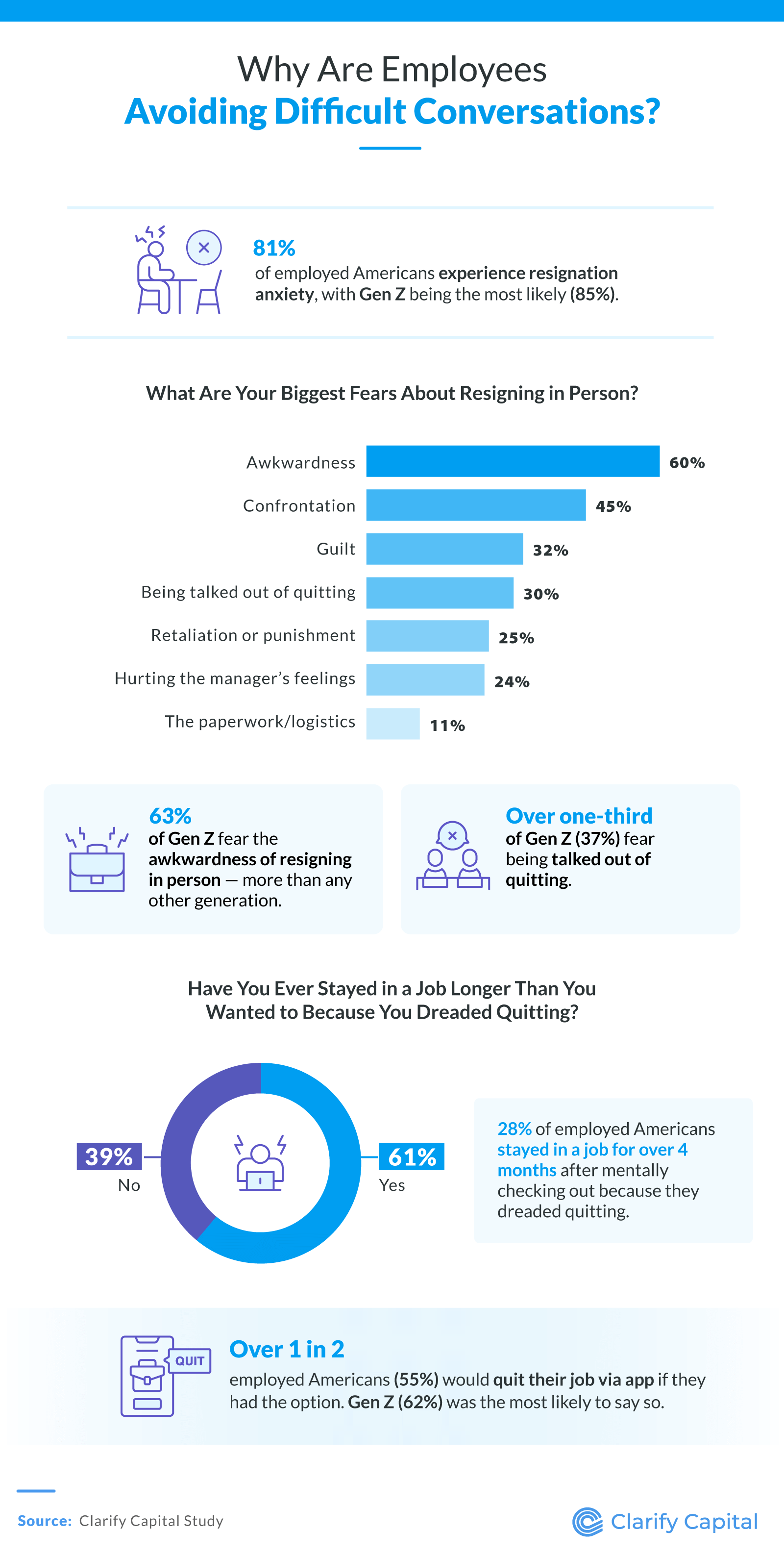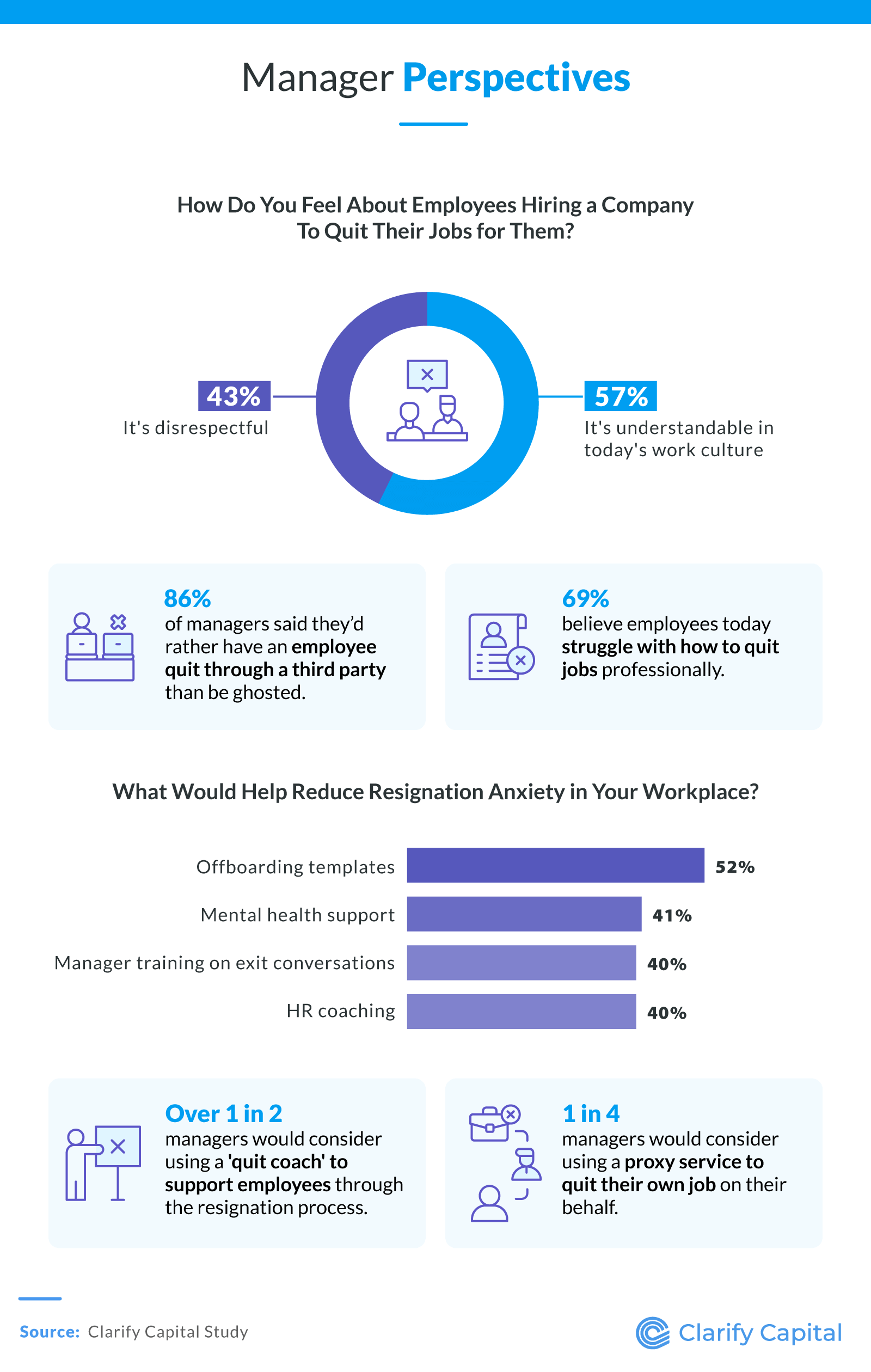Key Takeaways:
1 in 3 employed Americans would hire a company to quit their job for them.
Nearly 1 in 2 would be more likely to quit their job if they didn't have to deliver the news themselves, and Gen Z (60%) is the most likely to say so.
79% of Americans would pay up to $249 to avoid quitting in person.
81% of employed Americans experience resignation anxiety, with Gen Z (85%) being the most affected.
Over half of Americans (55%) would quit their job through an app if given the option.
28% of employed Americans stayed in a job for over 4 months after mentally checking out simply because they dreaded quitting.
1 in 4 managers would consider using a proxy service to quit their job.
The Rise of the Quit Proxy
From generational differences to industry trends, here's how familiar employees are with resignation by proxy and who's most likely to use it.

Only 31% of employed Americans knew what "resignation by proxy" meant, but that didn't stop a third of them from saying they'd hire a company to quit their job for them. Men were slightly more likely than women to consider this approach (34% vs. 31%), and onsite employees were more open to it (35%) than remote (32%) or hybrid workers (29%). Overall, 79% said they'd pay up to $249 to avoid the awkwardness of quitting in person.
Younger generations were the most likely to embrace the idea. Gen Z led the way, with 51% open to using a service to resign on their behalf and 60% saying they'd be more likely to quit if they didn't have to do it themselves. Nearly a third of employees (29%) admitted to having ghosted an employer rather than formally resigning, with Gen Z again topping the list at 32%.
Industries like tech and hospitality showed the strongest interest in quitting by proxy. In information technology, 42% said they'd pay someone to resign for them, followed closely by those in hospitality and food service (41%). Retail (33%), healthcare (32%), and marketing (29%) workers also showed notable interest.
Fear of Quitting
Letting go of a job can be an emotional hurdle to overcome. Our research shows just how widespread resignation anxiety is and how it's holding employees back from making the moves they want or need to make.

So many Americans — 81% — said they experience anxiety when it comes to quitting a job, with Gen Z feeling it the most at 85%. This fear can go beyond just nerves and have real consequences. Over a quarter (28%) admitted to staying in a job for more than 4 months after mentally checking out because they dreaded the resignation conversation.
Younger workers are especially impacted, with 64% of Gen Z and 62% of millennials saying they've stayed in a job they wanted to leave due to resignation anxiety. Nearly half of both groups also said that confrontation is their biggest fear when quitting a job in person. Gen Z was also the most worried about retaliation or punishment (30%) and the most likely to avoid quitting because they thought HR procedures were a waste of time (30%).
Some industries reported higher levels of resignation anxiety than others. Marketing professionals topped the list at 88%, followed by government workers (86%) and educators (85%). One potential solution could be making the resignation process more convenient and less personal. More than half of Americans (55%) said they'd use an app to quit if that option were available.
Quitting Is Hard — Even for Managers
It's not just junior employees who find quitting or confrontation uncomfortable. Many managers feel the pressure, too. We took a closer look at how people in leadership roles handle resignation-related stress and whether they'd lean on outside help to avoid it.

Some managers are open to alternative ways of handling uncomfortable workplace moments. Over half (57%) said it's understandable for employees to hire a resignation agency in today's work culture. A quarter would even consider using a proxy service to quit their own job, and 27% said they'd use one to handle a difficult conversation, such as delivering bad news to an employee or client.
Many managers have also seen the impact of resignation avoidance firsthand, with 60% having had employees ghost them rather than formally quit. To make the process easier, 52% of managers said offboarding templates could help reduce resignation anxiety. These could include things like prewritten emails or step-by-step guides designed to make resigning less stressful for both the employee and employer.
Extra support doesn't have to stop at tools, either. More than half of managers said they'd consider using a quit coach. This professional could guide employees through the resignation process and help them prepare for things like conversations, paperwork, and next steps.
The Business of Breaking up With Your Boss
Quitting a job can be nerve-wracking, and our data shows just how common resignation anxiety really is. Many employees and managers are open to finding easier ways to navigate these uncomfortable goodbyes. If you're feeling stuck or anxious about making a move, preparing a clear exit plan or using written communication can help make the process less stressful. The more we normalize honest, low-pressure ways to resign, the easier it becomes to move on.
Methodology
We surveyed 1,002 employed Americans to explore their sentiments about quitting their job. Among them, 80% were employees, and 20% were managers or people who were involved in hiring, offboarding, or managing employees. The generational breakdown among employees was as follows: Gen Z (13%), millennials (56%), Gen X (25%), and baby boomers (5%). The data was collected in April 2025.
About Clarify Capital
Clarify Capital specializes in fast, flexible financing to help small businesses thrive. With no-doc business loans and fast business loans up to $5 million, we provide entrepreneurs with financial solutions to help them grow from business owners to industry leaders.
Fair Use Statement
Feel free to share our findings for noncommercial use. Please credit Clarify Capital and include a link back to this page.

Bryan Gerson
Co-founder, Clarify
Bryan has personally arranged over $900 million in funding for businesses across trucking, restaurants, retail, construction, and healthcare. Since graduating from the University of Arizona in 2011, Bryan has spent his entire career in alternative finance, helping business owners secure capital when traditional banks turn them away. He specializes in bad credit funding, no doc lending, invoice factoring, and working capital solutions. More about the Clarify team →
Related Posts




![7 Best Equipment Financing Companies and Loan Options [2024]](/assets/blog/best-equipment-financing-companies/best-equipment-financing-companies-small-3874c9814fbefadd9f9419a140059f72e2893541ce88c7548a49986f0e852ee2.jpg)
